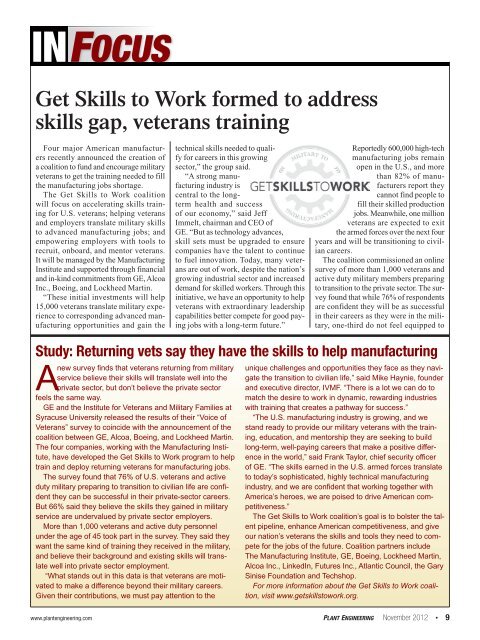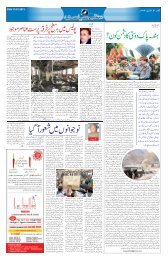2012 - PageSuite
2012 - PageSuite
2012 - PageSuite
Create successful ePaper yourself
Turn your PDF publications into a flip-book with our unique Google optimized e-Paper software.
INFOCUS<br />
Get Skills to Work formed to address<br />
skills gap, veterans training<br />
Four major American manufacturers<br />
recently announced the creation of<br />
a coalition to fund and encourage military<br />
veterans to get the training needed to fill<br />
the manufacturing jobs shortage.<br />
The Get Skills to Work coalition<br />
will focus on accelerating skills training<br />
for U.S. veterans; helping veterans<br />
and employers translate military skills<br />
to advanced manufacturing jobs; and<br />
empowering employers with tools to<br />
recruit, onboard, and mentor veterans.<br />
It will be managed by the Manufacturing<br />
Institute and supported through financial<br />
and in-kind commitments from GE, Alcoa<br />
Inc., Boeing, and Lockheed Martin.<br />
“These initial investments will help<br />
15,000 veterans translate military experience<br />
to corresponding advanced manufacturing<br />
opportunities and gain the<br />
technical skills needed to qualify<br />
for careers in this growing<br />
sector,” the group said.<br />
“A strong manufacturing<br />
industry is<br />
central to the longterm<br />
health and success<br />
of our economy,” said Jeff<br />
Immelt, chairman and CEO of<br />
GE. “But as technology advances,<br />
skill sets must be upgraded to ensure<br />
companies have the talent to continue<br />
to fuel innovation. Today, many veterans<br />
are out of work, despite the nation’s<br />
growing industrial sector and increased<br />
demand for skilled workers. Through this<br />
initiative, we have an opportunity to help<br />
veterans with extraordinary leadership<br />
capabilities better compete for good paying<br />
jobs with a long-term future.”<br />
Reportedly 600,000 high-tech<br />
manufacturing jobs remain<br />
open in the U.S., and more<br />
than 82% of manufacturers<br />
report they<br />
cannot find people to<br />
fill their skilled production<br />
jobs. Meanwhile, one million<br />
veterans are expected to exit<br />
the armed forces over the next four<br />
years and will be transitioning to civilian<br />
careers.<br />
The coalition commissioned an online<br />
survey of more than 1,000 veterans and<br />
active duty military members preparing<br />
to transition to the private sector. The survey<br />
found that while 76% of respondents<br />
are confident they will be as successful<br />
in their careers as they were in the military,<br />
one-third do not feel equipped to<br />
Study: Returning vets say they have the skills to help manufacturing<br />
A<br />
new survey finds that veterans returning from military<br />
service believe their skills will translate well into the<br />
private sector, but don’t believe the private sector<br />
feels the same way.<br />
GE and the Institute for Veterans and Military Families at<br />
Syracuse University released the results of their “Voice of<br />
Veterans” survey to coincide with the announcement of the<br />
coalition between GE, Alcoa, Boeing, and Lockheed Martin.<br />
The four companies, working with the Manufacturing Institute,<br />
have developed the Get Skills to Work program to help<br />
train and deploy returning veterans for manufacturing jobs.<br />
The survey found that 76% of U.S. veterans and active<br />
duty military preparing to transition to civilian life are confident<br />
they can be successful in their private-sector careers.<br />
But 66% said they believe the skills they gained in military<br />
service are undervalued by private sector employers.<br />
More than 1,000 veterans and active duty personnel<br />
under the age of 45 took part in the survey. They said they<br />
want the same kind of training they received in the military,<br />
and believe their background and existing skills will translate<br />
well into private sector employment.<br />
“What stands out in this data is that veterans are motivated<br />
to make a difference beyond their military careers.<br />
Given their contributions, we must pay attention to the<br />
unique challenges and opportunities they face as they navigate<br />
the transition to civilian life,” said Mike Haynie, founder<br />
and executive director, IVMF. “There is a lot we can do to<br />
match the desire to work in dynamic, rewarding industries<br />
with training that creates a pathway for success.”<br />
“The U.S. manufacturing industry is growing, and we<br />
stand ready to provide our military veterans with the training,<br />
education, and mentorship they are seeking to build<br />
long-term, well-paying careers that make a positive difference<br />
in the world,” said Frank Taylor, chief security officer<br />
of GE. “The skills earned in the U.S. armed forces translate<br />
to today’s sophisticated, highly technical manufacturing<br />
industry, and we are confident that working together with<br />
America’s heroes, we are poised to drive American competitiveness.”<br />
The Get Skills to Work coalition’s goal is to bolster the talent<br />
pipeline, enhance American competitiveness, and give<br />
our nation’s veterans the skills and tools they need to compete<br />
for the jobs of the future. Coalition partners include<br />
The Manufacturing Institute, GE, Boeing, Lockheed Martin,<br />
Alcoa Inc., LinkedIn, Futures Inc., Atlantic Council, the Gary<br />
Sinise Foundation and Techshop.<br />
For more information about the Get Skills to Work coalition,<br />
visit www.getskillstowork.org.<br />
www.plantengineering.com PLANT ENGINEERING November <strong>2012</strong> • 9

















